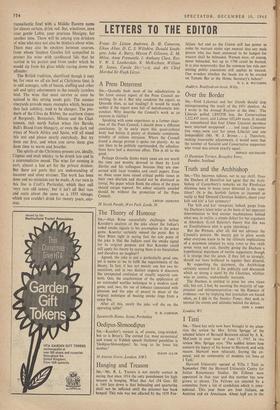Truth and the Archbishop
SIR,—This becomes tedious, not to say shrill. Doe,, the Duchess of Hamilton not agree that the Arch- bishop of Canterbury's remarks on the Rhodesian dilemma were in many cases distorted in the repe- tition? Or is the Scottish faction so incensed as really to find 'Onward Christian Soldiers, shoot your kith and kin' a fair summary?
The 'kith and kin' viewpoint, indeed, peeps from the Duchess's latest letter as the basis of her apparent determination to find sinister machinations behind what was, in reality,a simple defeat for her argument at Aberdeen. (Lord Balerno's theory that this was an Establishment plot is quite charming.) But the Primate, after all, did not advance the Council's posture. He merely put in plain words what everyone knew to be the ultimate implications of a statement adopted by sixty votes to five (with seven votes not cast, thereby giving the Duchess a hypbthetical maximum of twelve supporters; though it is strange that the .seven, if they felt so strongly, should not have bothered to register their dissent).
By supporting the statement, the Archbishop certainly secured for it the publicity and discussion which so strong a stand by the Churches, whether wise or unwise, undoubtedly warrants.
The Duchess is entitled to press her own views still, but not, I feel, by accusing the majority of sup- pression and misrepresentation—on the flimsiest of evidence—nor by implying that journalists are biased when, as I did in the Sunday Times, they seek to unravel the events and attitudes behind the debate. JOHN A. BARRY London, WI






































 Previous page
Previous page